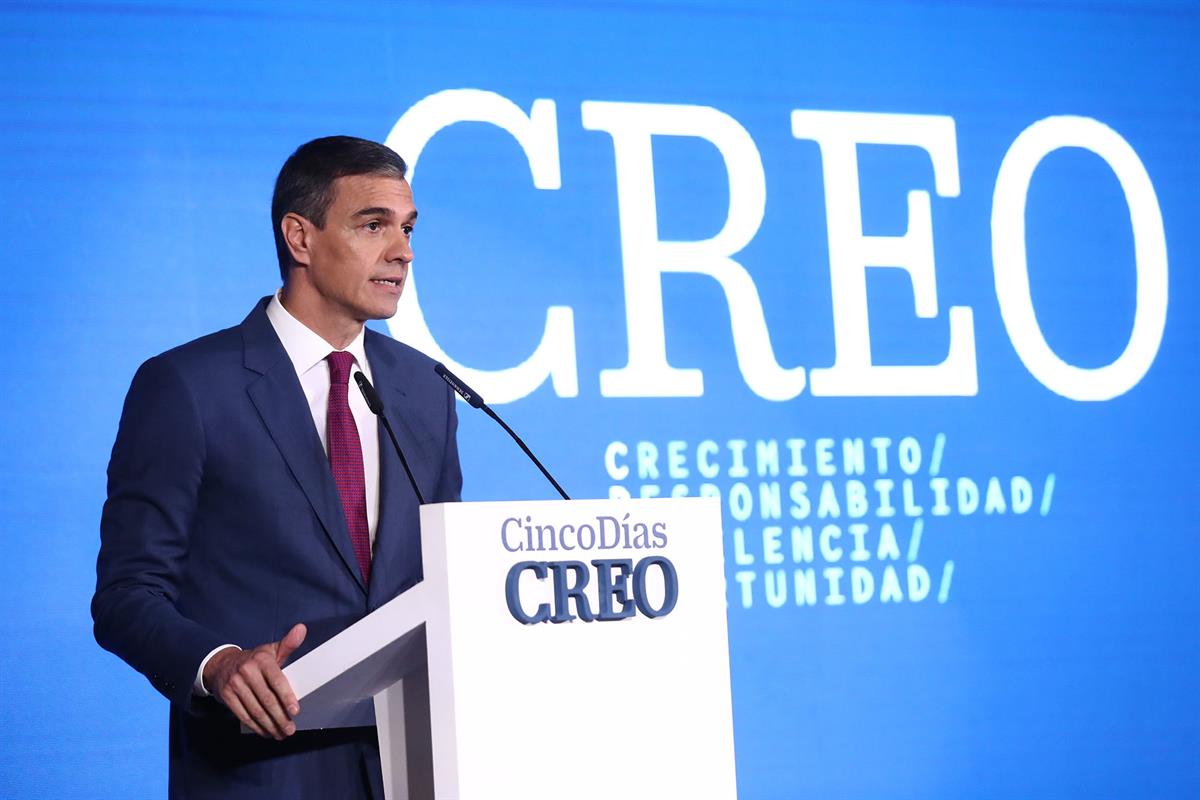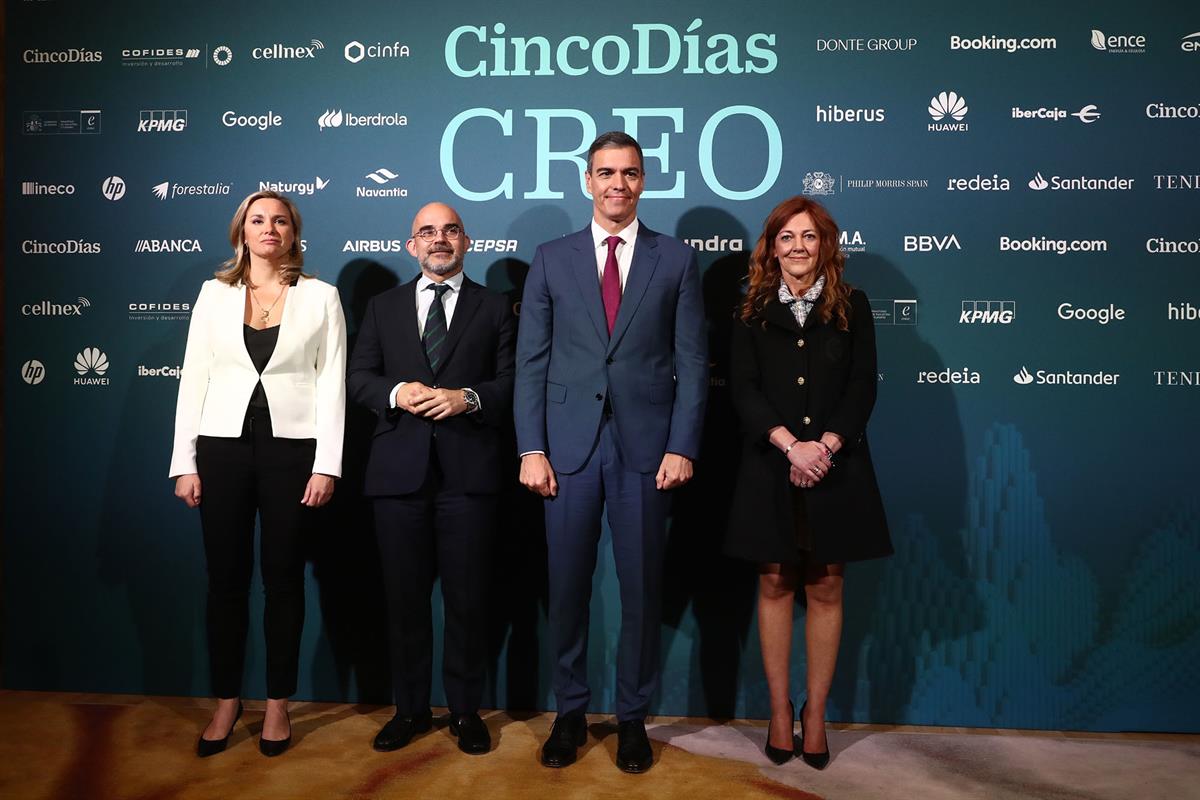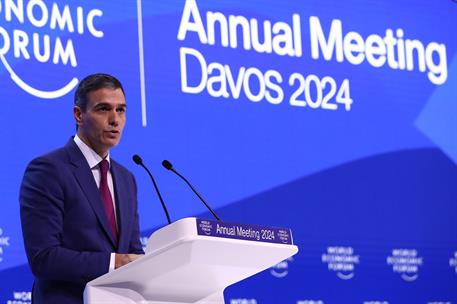Pedro Sánchez warns of the risk posed by the international far-right to democracies like Spain's based on progress, social justice and coexistence
President's News - 2024.5.20
Madrid
 The President of the Government of Spain, Pedro Sánchez, during his speech at the CREO economic forum (Pool Moncloa/Fernando Calvo)
The President of the Government of Spain, Pedro Sánchez, during his speech at the CREO economic forum (Pool Moncloa/Fernando Calvo)
Accordingly, the Spanish government's response "will be in keeping with the dignity that Spanish democracy represents and the fraternal ties that unite Spain and Argentina, now presided over by a president who, unfortunately, has not been up to the task", he said during his speech at the CREO economic forum, organised by the newspaper 'Cinco Días'.
"What we experienced yesterday does not speak of what Spaniards and Argentines feel. It does not speak of the union of two peoples who, in the most difficult moments, relied on each other to help them get back on their feet. It does not speak of the common roots that make us feel at home when we visit Buenos Aires or when the Argentine people visit Madrid," he said. On the other hand, he added, "what we experienced yesterday in Madrid does speak of the risk that the international far-right represents for societies such as ours, which base our democracy on the pillars of economic progress, social justice and coexistence".
On a national level, he indicated that "defending Spanish institutions from the insults and defamations that foreign leaders might make is a given because beyond ideology, there is education and patriotism".
Dialogue and coexistence: "prerequisites for stability and progress".
As he did last January at the World Economic Forum in Davos, the President of the Government has once again called on the business world to join in the defence of democracy and the humanist values that "have helped forge the best Europe". "Let us defend a successful model such as Spain against the reactionaries' retreat," he said.
In this respect, he expressed his conviction that "dialogue and coexistence are essential requirements for the stability and progress of society. "I assure you that this is the spirit that has driven and will continue to drive the actions of the Spanish government," he said.
During his speech, Pedro Sánchez defended Spain's "model of success" in the economic sphere and in social and territorial terms, thanks to the action of the government, employers, trade unions and civil society as a whole. He welcomed the fact that the main organisations and institutions, such as the Bank of Spain, the OECD, the IMF and the European Commission, have revised upwards their growth forecasts for Spain and "Spain is more united and more prosperous than in 2018".
On the economic front, he pointed out that Spain has almost 1.7 million more social security contributors than in January 2020, just before the pandemic; in mid-May the historic figure of 21.3 million contributors was exceeded; and the Spanish economy grew five times more than the Eurozone average in 2023. In addition, the OECD has recently confirmed that Spain has surpassed the pre-pandemic level of purchasing power, with rates of increase higher than those of France, Italy or Germany.
Moreover, Spain's growth forecasts for 2024 and 2025 are "notably higher" than those of the other major eurozone economies. "We have favourable economic and employment data, with good data on the evolution of inflation and public deficit, coexistence and understanding are winning in Catalonia. Far from the catastrophic discourse that Spain is breaking up and sinking, today we see that Spain is more united than in 2018 and is creating more jobs and growing more strongly and has more social justice", he added. In this line, he pointed out that Spain creates four out of every ten new jobs in the European Union, with an increase of 50% compared to 2018 with regard to scientific, technical and IT activities, and is the fourth country in the global ranking for attracting 'greenfield' projects in the period 2018-2024.
Behind these figures there are "great agreements", such as the labour reform, which has contributed to an 11.4% increase in the affiliation of people under 30 years of age and to 3.5 million more workers with permanent contracts than in 2022, and half a million more than a year ago. Also the increase in the minimum wage or the improvement in the coverage of the minimum living income, together with structural reforms, such as the Crea y Crece law, the law on Startups or the promotion of Vocational Training and R&D&I.
150,000 rural women trained in digital skills and connectivity
 Family photo of attendees at the CREO economic forum | Fotos: Pool Moncloa/Fernando Calvo
Family photo of attendees at the CREO economic forum | Fotos: Pool Moncloa/Fernando Calvo
The leader of the Executive has indicated that the "great performance" of the Spanish economy is largely explained by the impact of the Recovery Plan, which presents "excellent results" through public-private collaboration and is making it possible to modernise the productive fabric and undertake the green and digital transition of the economy, while at the same time reinforcing competitiveness.
The European funds "are allowing us to close the existing gaps", said Pedro Sánchez, who celebrated the fact that more than 150,000 rural women have already been trained in digital skills and connectivity. Spain is leading the deployment of fibre networks and 5G and is at the forefront of technologies such as artificial intelligence and is undertaking the digital transformation of the public sector and business. All this "offers the possibility of reindustrialising territories that have been unjustly ignored in the past", such as Extremadura and Andalusia, and of making progress in the energy transition.
"Spain looks to the future with ambition, optimism, without fear and with more solid foundations to grow and take advantage of opportunities", he concluded, after highlighting the improvement in the social sphere, with a 34% increase in the average pension and a 54% increase in the minimum wage compared to 2018, a 25% reduction in early school dropouts, an 18-point decrease in temporary employment and an investment in R&D&I that has doubled.
Non official translation






